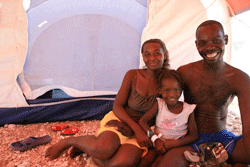A place to call home.
 |
| Marceline, Sabine and David live in the Coraille resettlement camp outside earthquake-ravaged Port-au-Prince. Oxfam has provided shelter, water, latrines and food. Photo: Jane Beesley |
For the 5000 people now living in Coraille camp 15km outside Port-au-Prince, life is certainly more comfortable and easier than in the months after the earthquake. Oxfam and other NGOs are supporting the people in the camp with a range of basic services such as shelter, water, latrines and food. The camp is designated as a temporary relocation site, but nobody knows how long people will live here.
Marceline Philidor, her daughter Sabine and husband David were among the first people to be moved from the Petionville golf club, where they faced imminent threat of flash floods, to the Coraille resettlement site.
Marceline’s tent is one of many in a long row within the vast, sunbaked camp. She cooks rice on a small stove under the awning in front.
“Life is pretty much the same here now as when we moved in,” she says. “We have our tent. We have enough water from Oxfam to drink and cook and wash. We have the latrines from Oxfam – there are enough for everyone.”
Oxfam has known since the Coraille site was selected in April that the area is isolated and doesn’t have markets close by.
“I have done some work,” says Marceline, “digging the trenches for drainage here in the camp, making them deeper, so we will have a little money soon. I have been the one working because I had my identification with me when they offered the work. My husband goes out almost every day looking for work. Sometimes he takes the tap tap (colourful Haitian mini-bus) that goes from here to town. But we don’t have much money so often he has to walk.”
“I go to all the old places I used to work before the earthquake,” says David. “I was a metalworker and then a driver. When I have to walk I leave here at 4.30 in the morning and I usually get there around 11. A man shouldn’t stay at home. He should be able to go out and work to support his wife and child. But there are no jobs.”
Marceline would like to start a little business again, a market stall. “But I wouldn’t start it here; I would go to one of the markets nearby, in Bon Repos. People say they might create a new market there so people here can work. I don’t know if it’s true. We have been asking to have a market and a hospital and a school for the people living here in the camp.”
The school is an important topic to David. “Aside from getting work, our main priority is Sabine’s education. I don’t want my daughter to grow up sitting around here not learning anything. I want her to go to school and learn. There is a good school in Bon Repos. I would like to take her there, but we would need money. Like before the earthquake.”
 |
| For David and Marceline, Sabine’s education is a priority. But to send her to school they need work and income security for the long term. Photo: Kateryna Perus |
There isn’t much around their temporary home, just one or two little plants sheltered by the side of the tent. “I wouldn’t mind having a house here, maybe build my own,” David says. “We like it here. And we don’t want to go back to Port-au-Prince. It is too crowded and there are no homes there.
“We would like a little place to plant trees so that they could give us shade, and we could have mangoes to eat. And some space to keep chickens.”
“We need a real home. We need some privacy. We also need to be able to have fun sometimes, have some kind of recreation. Maybe watch the world cup on TV!”
“But we don’t know if there will be homes. There are rumours that they might be moving us again. So we don’t know.”
These families need – and have the right – to start earning a living again, to send their children to school, and to have a clear idea of when they will finally have a home again. The Government of Haiti, with the support of international and national organisations, has the responsibility to develop and implement a housing, resettlement and job creation strategy that will get people back into homes and communities and earning an income. This is the crucial next step toward helping Haitians rebuild their lives for the long term.



